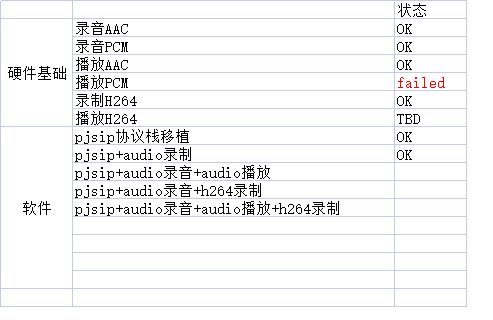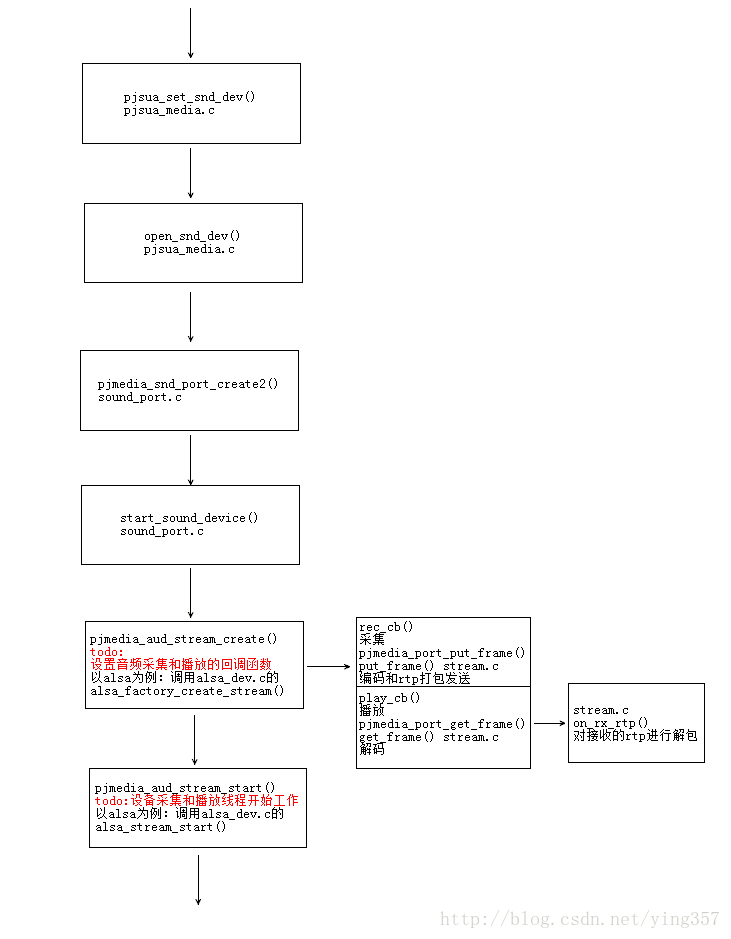在Hi3516ev300上调通PJSIP 的音频通话过程记录
关键词:pjsip、hi3516ev300、voip

第一步:pjsip在hi3516ev300的移植:
这个工作量相对较小,配置host为arm-himix100-linux编译都能顺利通过
./configure --host=arm-himix100-linux --prefix=$PWD/install --disable-libwebrtc --disable-libyuv --disable-v4l2 --disable-sound --disable-opencore-amrnb --disable-speex-codec --disable-speex-aec make
在/mpp/sample/路径下创建一个pjsip_app的路径;
简单的将simple_pjsua.c拷贝到这个路径下,修改Makefile,注意pjsip相关a库的引用顺序,参考:
https://blog.csdn.net/qq_40170041/article/details/124327913
Makefile参考:
# Hisilicon Hi35xx sample Makefile include ../Makefile.param SRCS := $(wildcard *.c) #TARGET := $(SRCS:%.c=%) SRCS += $(wildcard $(PWD)/adp/*.c) SRCS += $(wildcard $(PWD)/g711/*.c) SRCS += $(PWD)/opus/libopus.a SRCS += $(wildcard $(PWD)/pjsip/*.c) SRCS += $(PWD)/pjsip/lib/libpjsua-arm-himix100-linux-gnu.a SRCS += $(PWD)/pjsip/lib/libpjsip-ua-arm-himix100-linux-gnu.a SRCS += $(PWD)/pjsip/lib/libpjsip-arm-himix100-linux-gnu.a SRCS += $(PWD)/pjsip/lib/libpjsua2-arm-himix100-linux-gnu.a SRCS += $(PWD)/pjsip/lib/libpjsip-simple-arm-himix100-linux-gnu.a SRCS += $(PWD)/pjsip/lib/libpjmedia-codec-arm-himix100-linux-gnu.a SRCS += $(PWD)/pjsip/lib/libpjmedia-videodev-arm-himix100-linux-gnu.a SRCS += $(PWD)/pjsip/lib/libpjmedia-arm-himix100-linux-gnu.a SRCS += $(PWD)/pjsip/lib/libpjmedia-audiodev-arm-himix100-linux-gnu.a SRCS += $(PWD)/pjsip/lib/libpjnath-arm-himix100-linux-gnu.a SRCS += $(PWD)/pjsip/lib/libpjlib-util-arm-himix100-linux-gnu.a SRCS += $(PWD)/pjsip/lib/libresample-arm-himix100-linux-gnu.a SRCS += $(PWD)/pjsip/lib/libsrtp-arm-himix100-linux-gnu.a SRCS += $(PWD)/pjsip/lib/libgsmcodec-arm-himix100-linux-gnu.a SRCS += $(PWD)/pjsip/lib/libspeex-arm-himix100-linux-gnu.a SRCS += $(PWD)/pjsip/lib/libilbccodec-arm-himix100-linux-gnu.a SRCS += $(PWD)/pjsip/lib/libg7221codec-arm-himix100-linux-gnu.a SRCS += $(PWD)/pjsip/lib/libpjsdp-arm-himix100-linux-gnu.a SRCS += $(PWD)/pjsip/lib/libpj-arm-himix100-linux-gnu.a CFLAGS += -DPJ_AUTOCONF -DPJ_LINUX=1 -L$(REL_LIB) -I./ -I/pjsip/ -I./opus/include/ -I./pjsip/include/ -Wl,-rpath=/usr/lib TARGET := pjsip_app OBJ := $(SRC:%.c=%.o) TARGET_PATH := $(PWD) # compile linux or HuaweiLite include $(PWD)/../$(ARM_ARCH)_$(OSTYPE).mak
第二步:
打通pjsip的音频录制、编码发送逻辑,网上有说法是使用null_dev.c ,在编译pjsip时,修改config_site.h,增加:
#define PJMEDIA_AUDIO_DEV_HAS_NULL_AUDIO 1
这样pjsip的库里面就支持null_dev录音设备了,但这样不便于修改,所以不修改config_site.h,而是将null_dev.c拷贝到上面pjsip_app的路径下,然后在pjsua_init函数后面,动态注册设备:
//register null audio factory
{
pjmedia_aud_register_factory(&pjmedia_null_audio_factory);
}
参考lagency_audio.c 修改null_dev.c,打通录制和播放即可;
/* $Id$ */
/*
* Copyright (C) 2008-2011 Teluu Inc. (http://www.teluu.com)
*
* This program is free software; you can redistribute it and/or modify
* it under the terms of the GNU General Public License as published by
* the Free Software Foundation; either version 2 of the License, or
* (at your option) any later version.
*
* This program is distributed in the hope that it will be useful,
* but WITHOUT ANY WARRANTY; without even the implied warranty of
* MERCHANTABILITY or FITNESS FOR A PARTICULAR PURPOSE. See the
* GNU General Public License for more details.
*
* You should have received a copy of the GNU General Public License
* along with this program; if not, write to the Free Software
* Foundation, Inc., 59 Temple Place, Suite 330, Boston, MA 02111-1307 USA
*/
#include <pjmedia-audiodev/audiodev_imp.h>
#include <pj/assert.h>
#include <pj/log.h>
#include <pj/os.h>
#include <sys/types.h>
#include <sys/stat.h>
#include <pthread.h>
#include "audio_ringfifo.h"
#if 1
#define THIS_FILE "null_dev.c"
/* null_audio device info */
struct null_audio_dev_info
{
pjmedia_aud_dev_info info;
unsigned dev_id;
};
/* null_audio factory */
struct null_audio_factory
{
pjmedia_aud_dev_factory base;
pj_pool_t *pool;
pj_pool_factory *pf;
unsigned dev_count;
struct null_audio_dev_info *dev_info;
};
/* Sound stream. */
struct null_audio_stream
{
pjmedia_aud_stream base; /**< Base stream */
pjmedia_aud_param param; /**< Settings */
pj_pool_t *pool; /**< Memory pool. */
int rec_id; /* Capture device id */
int quit;
pjmedia_aud_rec_cb rec_cb; /**< Capture callback. */
unsigned pb_buf_size;
char *pb_buf;
pj_thread_t *pb_thread;
pjmedia_aud_play_cb play_cb; /**< Playback callback. */
unsigned ca_buf_size;
char *ca_buf;
pj_thread_t *ca_thread;
void *user_data; /**< Application data. */
};
/* Prototypes */
static pj_status_t null_factory_init(pjmedia_aud_dev_factory *f);
static pj_status_t null_factory_destroy(pjmedia_aud_dev_factory *f);
static pj_status_t null_factory_refresh(pjmedia_aud_dev_factory *f);
static unsigned null_factory_get_dev_count(pjmedia_aud_dev_factory *f);
static pj_status_t null_factory_get_dev_info(pjmedia_aud_dev_factory *f,
unsigned index,
pjmedia_aud_dev_info *info);
static pj_status_t null_factory_default_param(pjmedia_aud_dev_factory *f,
unsigned index,
pjmedia_aud_param *param);
static pj_status_t null_factory_create_stream(pjmedia_aud_dev_factory *f,
const pjmedia_aud_param *param,
pjmedia_aud_rec_cb rec_cb,
pjmedia_aud_play_cb play_cb,
void *user_data,
pjmedia_aud_stream **p_aud_strm);
static pj_status_t null_stream_get_param(pjmedia_aud_stream *strm,
pjmedia_aud_param *param);
static pj_status_t null_stream_get_cap(pjmedia_aud_stream *strm,
pjmedia_aud_dev_cap cap,
void *value);
static pj_status_t null_stream_set_cap(pjmedia_aud_stream *strm,
pjmedia_aud_dev_cap cap,
const void *value);
static pj_status_t null_stream_start(pjmedia_aud_stream *strm);
static pj_status_t null_stream_stop(pjmedia_aud_stream *strm);
static pj_status_t null_stream_destroy(pjmedia_aud_stream *strm);
/* Operations */
static pjmedia_aud_dev_factory_op factory_op =
{
&null_factory_init,
&null_factory_destroy,
&null_factory_get_dev_count,
&null_factory_get_dev_info,
&null_factory_default_param,
&null_factory_create_stream,
&null_factory_refresh
};
static pjmedia_aud_stream_op stream_op =
{
&null_stream_get_param,
&null_stream_get_cap,
&null_stream_set_cap,
&null_stream_start,
&null_stream_stop,
&null_stream_destroy
};
/****************************************************************************
* Factory operations
*/
/*
* Init null_audio audio driver.
*/
pjmedia_aud_dev_factory* pjmedia_null_audio_factory(pj_pool_factory *pf)
{
struct null_audio_factory *f;
pj_pool_t *pool;
pool = pj_pool_create(pf, "null audio", 1000, 1000, NULL);
f = PJ_POOL_ZALLOC_T(pool, struct null_audio_factory);
f->pf = pf;
f->pool = pool;
f->base.op = &factory_op;
return &f->base;
}
/* API: init factory */
static pj_status_t null_factory_init(pjmedia_aud_dev_factory *f)
{
struct null_audio_factory *nf = (struct null_audio_factory*)f;
struct null_audio_dev_info *ndi;
/* Initialize input and output devices here */
nf->dev_count = 1;
nf->dev_info = (struct null_audio_dev_info*)
pj_pool_calloc(nf->pool, nf->dev_count,
sizeof(struct null_audio_dev_info));
ndi = &nf->dev_info[0];
pj_bzero(ndi, sizeof(*ndi));
strcpy(ndi->info.name, "null device");
strcpy(ndi->info.driver, "null");
ndi->info.input_count = 1;
ndi->info.output_count = 1;
ndi->info.default_samples_per_sec = 16000;
/* Set the device capabilities here */
ndi->info.caps = 0;
PJ_LOG(4, (THIS_FILE, "null audio initialized"));
return PJ_SUCCESS;
}
/* API: destroy factory */
static pj_status_t null_factory_destroy(pjmedia_aud_dev_factory *f)
{
struct null_audio_factory *nf = (struct null_audio_factory*)f;
pj_pool_safe_release(&nf->pool);
return PJ_SUCCESS;
}
/* API: refresh the list of devices */
static pj_status_t null_factory_refresh(pjmedia_aud_dev_factory *f)
{
PJ_UNUSED_ARG(f);
return PJ_SUCCESS;
}
/* API: get number of devices */
static unsigned null_factory_get_dev_count(pjmedia_aud_dev_factory *f)
{
struct null_audio_factory *nf = (struct null_audio_factory*)f;
return nf->dev_count;
}
/* API: get device info */
static pj_status_t null_factory_get_dev_info(pjmedia_aud_dev_factory *f,
unsigned index,
pjmedia_aud_dev_info *info)
{
struct null_audio_factory *nf = (struct null_audio_factory*)f;
PJ_ASSERT_RETURN(index < nf->dev_count, PJMEDIA_EAUD_INVDEV);
pj_memcpy(info, &nf->dev_info[index].info, sizeof(*info));
return PJ_SUCCESS;
}
/* API: create default device parameter */
static pj_status_t null_factory_default_param(pjmedia_aud_dev_factory *f,
unsigned index,
pjmedia_aud_param *param)
{
struct null_audio_factory *nf = (struct null_audio_factory*)f;
struct null_audio_dev_info *di = &nf->dev_info[index];
PJ_ASSERT_RETURN(index < nf->dev_count, PJMEDIA_EAUD_INVDEV);
pj_bzero(param, sizeof(*param));
if (di->info.input_count && di->info.output_count) {
param->dir = PJMEDIA_DIR_CAPTURE_PLAYBACK;
param->rec_id = index;
param->play_id = index;
} else if (di->info.input_count) {
param->dir = PJMEDIA_DIR_CAPTURE;
param->rec_id = index;
param->play_id = PJMEDIA_AUD_INVALID_DEV;
} else if (di->info.output_count) {
param->dir = PJMEDIA_DIR_PLAYBACK;
param->play_id = index;
param->rec_id = PJMEDIA_AUD_INVALID_DEV;
} else {
return PJMEDIA_EAUD_INVDEV;
}
/* Set the mandatory settings here */
/* The values here are just some examples */
param->clock_rate = di->info.default_samples_per_sec;
param->channel_count = 1;
param->samples_per_frame = di->info.default_samples_per_sec * 20 / 1000;
param->bits_per_sample = 16;
/* Set the device capabilities here */
param->flags = 0;
return PJ_SUCCESS;
}
/* API: create stream */
static pj_status_t null_factory_create_stream(pjmedia_aud_dev_factory *f,
const pjmedia_aud_param *param,
pjmedia_aud_rec_cb rec_cb,
pjmedia_aud_play_cb play_cb,
void *user_data,
pjmedia_aud_stream **p_aud_strm)
{
struct null_audio_factory *nf = (struct null_audio_factory*)f;
pj_pool_t *pool;
struct null_audio_stream *strm;
/* Create and Initialize stream descriptor */
pool = pj_pool_create(nf->pf, "null_audio-dev", 1000, 1000, NULL);
PJ_ASSERT_RETURN(pool != NULL, PJ_ENOMEM);
strm = PJ_POOL_ZALLOC_T(pool, struct null_audio_stream);
pj_memcpy(&strm->param, param, sizeof(*param));
strm->pool = pool;
strm->rec_cb = rec_cb;
strm->play_cb = play_cb;
strm->user_data = user_data;
strm->quit = 0;
/* Create player stream here */
if (param->dir & PJMEDIA_DIR_PLAYBACK) {
strm->pb_buf_size = 720;
strm->pb_buf = (char*) pj_pool_alloc (strm->pool, strm->pb_buf_size);
}
/* Create capture stream here */
if (param->dir & PJMEDIA_DIR_CAPTURE) {
/* Set our buffer */
strm->ca_buf_size = 720;
strm->ca_buf = (char*) pj_pool_alloc (strm->pool, strm->ca_buf_size);
}
/* Apply the remaining settings */
/* Below is an example if you want to set the output volume */
if (param->flags & PJMEDIA_AUD_DEV_CAP_OUTPUT_VOLUME_SETTING) {
null_stream_set_cap(&strm->base,
PJMEDIA_AUD_DEV_CAP_OUTPUT_VOLUME_SETTING,
¶m->output_vol);
}
/* Done */
strm->base.op = &stream_op;
*p_aud_strm = &strm->base;
return PJ_SUCCESS;
}
/* API: Get stream info. */
static pj_status_t null_stream_get_param(pjmedia_aud_stream *s,
pjmedia_aud_param *pi)
{
struct null_audio_stream *strm = (struct null_audio_stream*)s;
PJ_ASSERT_RETURN(strm && pi, PJ_EINVAL);
pj_memcpy(pi, &strm->param, sizeof(*pi));
/* Example: Update the volume setting */
if (null_stream_get_cap(s, PJMEDIA_AUD_DEV_CAP_OUTPUT_VOLUME_SETTING,
&pi->output_vol) == PJ_SUCCESS)
{
pi->flags |= PJMEDIA_AUD_DEV_CAP_OUTPUT_VOLUME_SETTING;
}
return PJ_SUCCESS;
}
/* API: get capability */
static pj_status_t null_stream_get_cap(pjmedia_aud_stream *s,
pjmedia_aud_dev_cap cap,
void *pval)
{
struct null_audio_stream *strm = (struct null_audio_stream*)s;
PJ_UNUSED_ARG(strm);
PJ_ASSERT_RETURN(s && pval, PJ_EINVAL);
/* Example: Get the output's volume setting */
if (cap==PJMEDIA_AUD_DEV_CAP_OUTPUT_VOLUME_SETTING)
{
/* Output volume setting */
*(unsigned*)pval = 0; // retrieve output device's volume here
return PJ_SUCCESS;
} else {
return PJMEDIA_EAUD_INVCAP;
}
}
/* API: set capability */
static pj_status_t null_stream_set_cap(pjmedia_aud_stream *s,
pjmedia_aud_dev_cap cap,
const void *pval)
{
struct null_audio_stream *strm = (struct null_audio_stream*)s;
PJ_UNUSED_ARG(strm);
PJ_ASSERT_RETURN(s && pval, PJ_EINVAL);
/* Example */
if (cap==PJMEDIA_AUD_DEV_CAP_OUTPUT_VOLUME_SETTING)
{
/* Output volume setting */
// set output's volume level here
return PJ_SUCCESS;
}
return PJMEDIA_EAUD_INVCAP;
}
extern void start_pcm_record(int sample_rate, int payload_type);
extern void stop_pcm_record();
static int pb_thread_func (void *arg)
{
struct null_audio_stream* stream = (struct null_audio_stream*) arg;
void* user_data = stream->user_data;
pj_timestamp tstamp;
int result;
int size = stream->pb_buf_size;
char* buf = stream->pb_buf;
tstamp.u64 = 0;
while (!stream->quit) {
pjmedia_frame frame;
frame.type = PJMEDIA_FRAME_TYPE_AUDIO;
frame.buf = buf;
frame.size = 160;
frame.timestamp.u64 = tstamp.u64;
frame.bit_info = 0;
#if 0
result = stream->play_cb (user_data, &frame);
if (result != PJ_SUCCESS || stream->quit)
break;
if (frame.type != PJMEDIA_FRAME_TYPE_AUDIO)
pj_bzero (buf, size);
#endif//no value.
#if 0
result = snd_pcm_writei (pcm, buf, nframes);
if (result == -EPIPE) {
PJ_LOG (4,(THIS_FILE, "pb_thread_func: underrun!"));
snd_pcm_prepare (pcm);
} else if (result < 0) {
PJ_LOG (4,(THIS_FILE, "pb_thread_func: error writing data!"));
}
#endif//
tstamp.u64 += 160;/* samples_per_frame */
usleep(1000*2000);
}
//TRACE_((THIS_FILE, "pb_thread_func: Stopped"));
return PJ_SUCCESS;
}
static int ca_thread_func (void *arg)
{
struct null_audio_stream* stream = (struct null_audio_stream*) arg;
void* user_data = stream->user_data;
pj_timestamp tstamp;
int result;
struct audio_ringbuf temp_audio_ringinfo;
int audio_ringbufflen = 0;
struct timespec ts = {0,33333};// 1|\A8\ACs = 1000ns 33us?
tstamp.u64 = 0;
while (!stream->quit) {
pjmedia_frame frame;
nanosleep(&ts, NULL);
//get audio
audio_ringbufflen = audio_ringget(&temp_audio_ringinfo);
if(audio_ringbufflen ==0){
continue ;
}
if (stream->quit)
break;
if (stream->ca_buf_size > audio_ringbufflen){
memcpy(stream->ca_buf, temp_audio_ringinfo.buffer, audio_ringbufflen);
}else{
continue;
}
//PJ_LOG(4, (THIS_FILE, "get pcm buffer:%d", audio_ringbufflen));
frame.type = PJMEDIA_FRAME_TYPE_AUDIO;
frame.buf = (void*) stream->ca_buf;
frame.size = audio_ringbufflen;
frame.timestamp.u64 = tstamp.u64;
frame.bit_info = 0;
result = stream->rec_cb(user_data, &frame);
if (result != PJ_SUCCESS || stream->quit){
break;
}
tstamp.u64 += 160;/* samples_per_frame */
}
//TRACE_((THIS_FILE, "ca_thread_func: Stopped"));
return PJ_SUCCESS;
}
/* API: Start stream. */
static pj_status_t null_stream_start(pjmedia_aud_stream *strm)
{
struct null_audio_stream *stream = (struct null_audio_stream*)strm;
pj_status_t status = PJ_SUCCESS;
PJ_LOG(4, (THIS_FILE, "Starting null audio stream"));
stream->quit = 0;
if (stream->param.dir & PJMEDIA_DIR_CAPTURE_PLAYBACK){
status = pj_thread_create (stream->pool,
"hisi_playback",
pb_thread_func,
stream,
0, //ZERO,
0,
&stream->pb_thread);
if (status != PJ_SUCCESS)
return status;
status = pj_thread_create (stream->pool,
"hisi_capture",
ca_thread_func,
stream,
0, //ZERO,
0,
&stream->ca_thread);
if (status != PJ_SUCCESS) {
stream->quit = PJ_TRUE;
pj_thread_join(stream->pb_thread);
pj_thread_destroy(stream->pb_thread);
stream->pb_thread = NULL;
}
}else if (stream->param.dir & PJMEDIA_DIR_PLAYBACK) {
status = pj_thread_create (stream->pool,
"hisi_playback",
pb_thread_func,
stream,
0, //ZERO,
0,
&stream->pb_thread);
if (status != PJ_SUCCESS)
return status;
}else if (stream->param.dir & PJMEDIA_DIR_CAPTURE) {
status = pj_thread_create (stream->pool,
"hisi_capture",
ca_thread_func,
stream,
0, //ZERO,
0,
&stream->ca_thread);
if (status != PJ_SUCCESS) {
stream->quit = PJ_TRUE;
if (stream->pb_thread != NULL){
pj_thread_join(stream->pb_thread);
pj_thread_destroy(stream->pb_thread);
}
stream->pb_thread = NULL;
}
}
//open one thread to get pcm buffer ?
start_pcm_record(8000, 1);
//start read from fifo
return PJ_SUCCESS;
}
/* API: Stop stream. */
static pj_status_t null_stream_stop(pjmedia_aud_stream *strm)
{
struct null_audio_stream *stream = (struct null_audio_stream*)strm;
stream->quit = 1;
PJ_LOG(4, (THIS_FILE, "null_stream_stop enter!\n"));
if (stream->pb_thread) {
//TRACE_((THIS_FILE, "null_audio_stream_stop Waiting for playback to stop."));
pj_thread_join (stream->pb_thread);
//TRACE_((THIS_FILE, "null_audio_stream_stop: playback stopped."));
pj_thread_destroy(stream->pb_thread);
stream->pb_thread = NULL;
}
PJ_LOG(4, (THIS_FILE, "Stopping null audio capture stream"));
if (stream->ca_thread) {
//TRACE_((THIS_FILE, "null_audio_stream_stop Waiting for capture to stop."));
pj_thread_join (stream->ca_thread);
//TRACE_((THIS_FILE, "null_audio_stream_stop(%u): capture stopped."));
pj_thread_destroy(stream->ca_thread);
stream->ca_thread = NULL;
}
PJ_LOG(4, (THIS_FILE, "Stopping null audio stream"));
stop_pcm_record();
return PJ_SUCCESS;
}
/* API: Destroy stream. */
static pj_status_t null_stream_destroy(pjmedia_aud_stream *strm)
{
struct null_audio_stream *stream = (struct null_audio_stream*)strm;
PJ_LOG(4, (THIS_FILE, "null_stream_destroy enter!\n"));
PJ_ASSERT_RETURN(stream != NULL, PJ_EINVAL);
null_stream_stop(strm);
pj_pool_release(stream->pool);
return PJ_SUCCESS;
}
#endif /* PJMEDIA_AUDIO_DEV_HAS_NULL_AUDIO */关键是null_stream_start 和null_stream_stop适配的两个线程,用于将录音的数据发给编码器,和将接收到的数据喂给播放器!

图片来源:https://blog.csdn.net/jack909633117/article/details/103656966
-------------------广告线---------------
项目、合作,欢迎勾搭,邮箱:promall@qq.com
本文为呱牛笔记原创文章,转载无需和我联系,但请注明来自呱牛笔记 ,it3q.com

- 最新评论
- 总共0条评论


